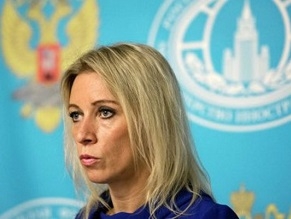|
World Jewish News

Russian Foreign Ministry spokeswoman Maria Zakharova
|
Russia to Israel: Stop 'arbitrary' attacks in Syria
25.01.2019, Israel and the World Israeli attacks on Iranian targets in Syria this week triggered a public censure from Moscow on Wednesday, with the Russian Foreign Ministry calling on Israel to stop its “arbitrary” attacks in Syria.
“The practice of arbitrary strikes on the territory of a sovereign state – in this case, we are talking about Syria – should be ruled out,” Foreign Ministry spokeswoman Maria Zakharova said, in answer to a question from Russian news agency TASS about recent Israeli airstrikes on Syria.
She said such strikes added to tensions in the region, something she said was not in the long-term interests of any country there, including Israel.
“We should never allow Syria, which has suffered years of armed conflict, to be turned into an arena where geopolitical scores are settled,” Zakharova said.
These comments followed a predawn Israeli retaliatory raid in Syria on Monday that the UK-based Syrian Observatory for Human Rights said killed 21 people, 12 of them believed to be members of the Iranian Revolutionary Guard Corps.
That raid, which reportedly targeted 38 sites, followed Iran’s launching of a missile on Sunday toward Mount Hermon that was intercepted by an Iron Dome battery. Said missile launch was in response to an unusual Israeli daylight missile attack on Iranian targets in Syria, which Israel immediately took responsibility for.
The Russians have been active militarily in Syria since October 2015 to prevent the downfall of its ally, Syrian President Bashar Assad. Ever since that time, Israel and Russia have coordinated closely to ensure that their two militaries do not accidentally clash in Syria.
While the Prime Minister’s Office did not issue a response to the Russian statement, Jerusalem Affairs Minister Ze’ev Elkin – who has accompanied and served as a translator for Prime Minister Benjamin Netanyahu during his numerous meetings with Russian President Vladimir Putin over the last number of years – said that Israel has made clear to Russia, both in public and in private, that it has redlines in Syria.
“Our position hasn’t changed,” he said in a Kan Bet interview. “We have three redlines.” He described those redlines as preventing the turning of the Golan Heights into a terrorist base against Israel; not allowing the transfer of advanced weapons to Hezbollah in Lebanon; and keeping Iran from entrenching itself militarily inside Syria.
Asked for a response to the Russian Foreign Ministry statement, Elkin said that Israel will have discussions with Moscow, “but we have redlines, and I think that we have proven our determination to enforce them.”
He dismissed the notion that Israel’s new policy of taking responsibility for attacks in Syria, rather than not speaking out publicly about the attacks, as was traditionally the case, was responsible for Moscow’s censure. Russia, like everyone else, knows what Israel has done in the past, he said.
Russian Ambassador Anatoly Viktorov said in an i24News interview on Tuesday, however, that he thought that Israel’s claiming responsibility for the attacks was connected to the elections.
“The Israeli Ministry of Defense now makes immediate comments on any strikes at a very, very high level – and in our mind, this is very much connected to the election campaign,” he said.
Viktorov is not the only one with this opinion. Yesh Atid leader Yair Lapid blamed the Russian scolding on Netanyahu’s decision to start taking public credit for the airstrikes.
“He has gone from being Mr. Security to Mr. Microphone,” Lapid wrote on Twitter. “After years of quiet, successful cooperation, Netanyahu’s election blabbering forced the Russians to come out against us on the Syrian front.”
Lapid said it would take years to recover the damage to Israel’s relationship with Russia caused by Netanyahu.
The Likud responded by calling Lapid’s attacks baseless and reminding voters that his only military experience was working as a journalist for the military magazine Bamahane.
“Former IDF chief of staff Gadi Eisenkot said in his parting speech that there were no political considerations in the prime minister’s decisions,” the Likud said in a statement.
Hatnua head Tzipi Livni also said Netanyahu was acting irresponsibly and out of internal political motivations.
“The [Russian announcement is the] result of Netanyahu’s callous political-security policy,” Livni said. “He breaks the policy of ambiguity for personal political reasons and restricts the IDF in the battle in the North.”
Reuters contributed to this report.
BY HERB KEINON, GIL HOFFMAN
JPost.com
|
|
